Europe and Bulgaria 2010: Something happened
Ralitsa Kovacheva, December 22, 2010
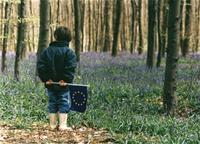 The past year is a memorable one in European history and this can be said even now, before it's over. Usually we say that, in terms of history, it is very difficult one thing or another to be really assessed in the present, but this is not the case.
The past year is a memorable one in European history and this can be said even now, before it's over. Usually we say that, in terms of history, it is very difficult one thing or another to be really assessed in the present, but this is not the case.
The passing year took off the mask of united Europe and the European Union had to face the merciless reality of a bureaucratic, institutional unification, which was not backed by an actual unification - both at economic level, which was known, and at the level of mentality, which was ignored.
In 2010 the EU made a compulsory step towards a previously unthinkable integration. While many believe the so-called enhanced economic governance (which legislatively is not a 100% fact, but will be by mid-2011) is half-done and timid, it was previously unthinkable too. It was unthinkable the Germans or the British to agree to show their budgets firstly in Brussels and then to their national parliaments.
It was unthinkable to talk about real sanctions (fines) for breaching the Stability and Growth Pact, given that until recently it was more a formality, since it was violated first by France and Germany. Even more unthinkable is that they are already talking about a fiscal union within which the countries, especially in the eurozone, will have common taxes and common labour laws. And the one who is speaking about it is not just anybody, but namely Angela Merkel who was unofficially declared a “non-European” of the year across Europe.
The unthinkable became thinkable because of the unthinkable  circumstances - euro area countries are on the brink of bankruptcy. Their budgets are threatened, their creditors are endangered (large banks from other euro area countries), the financial stability of the euro area as a whole and the prestige of the euro, the biggest European pride, are at stake.
circumstances - euro area countries are on the brink of bankruptcy. Their budgets are threatened, their creditors are endangered (large banks from other euro area countries), the financial stability of the euro area as a whole and the prestige of the euro, the biggest European pride, are at stake.
So if I have to determine the European event of the outgoing year I will choose exactly this process of destruction of a European legend and the beginning of a real, albeit forced integration. However, its success will depend on whether it will remain another institutional exercise, without any response in every individual European citizen, regardless if one is fighting the crisis in Berlin, London or Stockholm, or is simply surviving in Sofia or Bucharest.
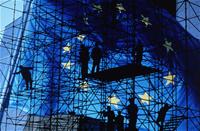 Some analysts have accused the Eurocrats for years that they have created a European reality for themselves and a European appearance for the citizens. Although I am of the few believers in the European idea as the only alternative for the Old continent, I have to admit that the skeptics have won. It has been proved by the Greeks who have scammed Brussels with their statistics. It has been proved by the Spanish and the Portuguese, who have benefited from the generous EU funds to save the effort to make the necessary market reforms.
Some analysts have accused the Eurocrats for years that they have created a European reality for themselves and a European appearance for the citizens. Although I am of the few believers in the European idea as the only alternative for the Old continent, I have to admit that the skeptics have won. It has been proved by the Greeks who have scammed Brussels with their statistics. It has been proved by the Spanish and the Portuguese, who have benefited from the generous EU funds to save the effort to make the necessary market reforms.
It has been proved by the Hungarians and Romanians who are in dire economic situation and rely on external financing, and the Hungarians have even eradicated their private pension funds to fill in the deficit of the state social insurance. It has been proved by the Germans who are refusing to pay the debts of the peripheral economies, and by the British who do not want to hear a word about increasing EU's budget, while the countries are desperately cutting costs.
Why should we be Europeans, half a billion citizens of the European continent 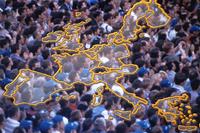 are asking, in this very moment. The answer, however, cannot come only from politicians. It should be born precisely in the aftermath of this crisis of European identity, unknown by scale. And everyone has to find the answer for him or herself. It is quite possible to happen in one part of the continent, because even if there are no common labour laws or common taxes, there are common principles, common values, common understanding of how society functions.
are asking, in this very moment. The answer, however, cannot come only from politicians. It should be born precisely in the aftermath of this crisis of European identity, unknown by scale. And everyone has to find the answer for him or herself. It is quite possible to happen in one part of the continent, because even if there are no common labour laws or common taxes, there are common principles, common values, common understanding of how society functions.
In another part of the EU, however, the picture is radically different. It is enough to look at what is happening in Greece, Spain and Portugal. Against this background, Bulgaria really seems one of the best financial performers. So what? The standard of living in Bulgaria is still worse than in the countries often called “distressed”. Bulgaria is still looking different from what we call “Europe”.
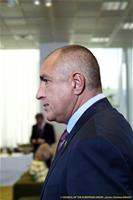 It is quite enough to look at Prime Minister Boyko Borisov`s behaviour at the European Councils in Brussels – while the leaders are communicating informally before the meetings, reviewing documents or just talking, he is standing aside alone with a rigid look. This is Bulgaria in the European Union - it is present but not participating. In its EU membership appearance Sofia exists in a formal suit, but in silence. In its domestic reality, however, the official power is not sparing its efforts in the battle for the electorate.
It is quite enough to look at Prime Minister Boyko Borisov`s behaviour at the European Councils in Brussels – while the leaders are communicating informally before the meetings, reviewing documents or just talking, he is standing aside alone with a rigid look. This is Bulgaria in the European Union - it is present but not participating. In its EU membership appearance Sofia exists in a formal suit, but in silence. In its domestic reality, however, the official power is not sparing its efforts in the battle for the electorate.
This duality is extremely clear, traced through the media. For people interested in European issues it is obvious that these are simply absent from Bulgarian media, even as news. Not to mention some contributions to the public debates, conducted throughout the year across Europe, especially in terms of the economic and financial problems of the Union. By contrast, through mainstream media the ordinary Bulgarian receives regularly in small doses the following message: the complacent Eurocrats order member states to cut their budget expenditures; Europe is swept by waves of protests; poor citizens suffer because of the foolish billionaires with their banks and greedy politicians. Without commenting on the percentage of truth in these allegations, I will confine myself in the assessment of the effects of this media image.
The first is that citizens acquire the status of victims, as though they have inhabited a parallel reality so far, different from that of the bankers, entrepreneurs and politicians. The second is that the problems are being simplified to pure survival, embodied in female reporters with empty carts in stores or live coverages of fighting consumers in a newly opened supermarket.
In this context, it is easy national policy to be presented as a subject of 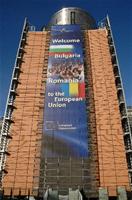 a foreign evil will and as far as the government is doing something, it is to fight the evil Brussels in order to provide money for needy Bulgarians. Who, in turn, take for granted the state's obligation to provide them, if not with a decent living, at least with food. The state-Saviour has risen from the ashes of liberal economy, which some analysts hastily announced to be buried by the crisis. This is in line too with the favourite European mantra of a social welfare state, a guardian of the disadvantaged and an advocate of the weak. It has served especially well in politicians' attempts to explain why they wanted to take the profits of the banks (in the form of new taxes) and to use them to fill the holes in the budgets.
a foreign evil will and as far as the government is doing something, it is to fight the evil Brussels in order to provide money for needy Bulgarians. Who, in turn, take for granted the state's obligation to provide them, if not with a decent living, at least with food. The state-Saviour has risen from the ashes of liberal economy, which some analysts hastily announced to be buried by the crisis. This is in line too with the favourite European mantra of a social welfare state, a guardian of the disadvantaged and an advocate of the weak. It has served especially well in politicians' attempts to explain why they wanted to take the profits of the banks (in the form of new taxes) and to use them to fill the holes in the budgets.
Against the background of this social (and even socialist) pathos, however, the actions speak for themselves: in Greece or Ireland, Portugal and Spain, the password is the same: market reforms, especially liberalisation of labour market, restarting the single market in all areas, reduction of governments' commitment to social protection at the expense of fostering entrepreneurship.
Through the media window already described, however, only the first half of the message is reaching Bulgarian audience. Feed the hungry! Give to the poor! Who are poor? Everyone is! Not an evening goes by without the personal story of a Bulgarian family on the brink of survival to push me from the TV screen, supported by polls, according to which 80% of Bulgarians consider themselves poor. And here enters ... the prime minister, performing the role of the Saviour, who will feed the hungry, will comfort the afflicted, will render justice.
As far as the image of the prime minister is important to this analysis, it symbolises the event of the year for Bulgaria. Which, like what is happening in Europe, is also a process, but in a totally opposite direction. For one year, in terms of mentality, Bulgaria has made such a step back, which we do not remember for the last 20 years. For the past year the resurrection of our recent past has happened with such an incredible speed, as would have been impossible if the Mausoleum of Georgi Dimitrov (a famous Bulgarian communist activist) was rebuilt in its previous form. Moreover, this happened not just because the prime minister was a bodyguard of Todor Zhivkov or because he perceives himself as a man from the people. It is not that simple.
The propaganda line imposed on all channels from the top to the bottom intrudes with analogies of communist Bulgaria categorically and unambiguously. There is one party, one leader, one position. It can change a hundred times a day, but what is important is for us to be flexible enough to change with it. Verification is the highest form of trust, the prime minister says, the authorities must be monitored, must be eavesdropped. And not only the authorities, I would add, the opposition too, the biggest critics - mostly.
The government is helping mostly the peasants (especially tobacco growers), because the prime minister remembers how, as a child, he had mowed lucerne for the rabbits and fed the hens with corn. The trade unions are representing the workers (not programmers, for example, although the government claims that the IT sector is a priority for economic growth), because workers and rural electorate are potential voters unlike the intellectuals, scientists, entrepreneurs.
The power understands people - they say we won't work, it says - fine, retire early, those who work should give it a thought. They say - we want free health care, the government says - fine, it will be free - the national health care fund will save the money for the doctors (who anyway receive 30,000 levs each or 15,ooo euro). They say - we want social benefits, it says - fine, we will give you social benefits. The government postponed the needed harmful pension reforms and in spite of the announced spending cuts, it has continued to give extra money for social payments, for the heating of universities, for churches, for famous artists pensions or simply because someone is asking. It is giving now because elections are coming and it will need votes. And most importantly, we will not throw a stone into the swamp called reforms.
Who makes serious reforms in an election time? No one. The elections will pass, but who makes reforms at the end of a mandate? Elections come again, don’t they? Especially if one has adopted electoral rules which, if not fully ensuring at least strongly supporting one’s victory; it’s a sin to lose voters because of some „reforms”, which on top of it are not wanted by us, Brussels wants them! Do you remember the “bad Brussels” which says, you have to work longer and more, and better because the money for pensions is not enough and competitiveness is deteriorating?
Not that people's love has not been used far too often and in a too vulgar way for the last few years, but this time the voter has just laid down as a naked maiden in a dewy field anticipating the hero who cast her on his shoulders. After a year and a half, the maiden is still looking with moisture in her eyes and isn’t asking where the hero is taking her to … The important thing is to feel his firm hand around her waist.
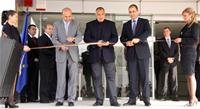 What happened in Bulgaria during the past year is what didn’t happen - the change. Because the return of the stereotypes of our recent past and the myths of the more distant one is not a change. The populist propaganda has reached heights which Dogan (Ahmed Dogan, a politician, leader of the Movement for Rights and Freedoms, representing the Turkish minority in Bulgaria) with his philosophical discourse can only envy. Instead of new jobs, relics were revealed; instead of scientific findings, road segments were opened (small, but many), kindergartens, x-ray machines. Instead of opening our society (not to mention globalisation, at least Europe should be our greater “I” and not an external reality), we closed it in the Balkan-Oriental smoky twilight of its everyday life. Our mentality eroded to the curiosity about the dosage of the consequent silicone injection of footballers’ lovers.
What happened in Bulgaria during the past year is what didn’t happen - the change. Because the return of the stereotypes of our recent past and the myths of the more distant one is not a change. The populist propaganda has reached heights which Dogan (Ahmed Dogan, a politician, leader of the Movement for Rights and Freedoms, representing the Turkish minority in Bulgaria) with his philosophical discourse can only envy. Instead of new jobs, relics were revealed; instead of scientific findings, road segments were opened (small, but many), kindergartens, x-ray machines. Instead of opening our society (not to mention globalisation, at least Europe should be our greater “I” and not an external reality), we closed it in the Balkan-Oriental smoky twilight of its everyday life. Our mentality eroded to the curiosity about the dosage of the consequent silicone injection of footballers’ lovers.
In such a reality there is no room for discussion about why we should be Europeans, not  before we had the other debate - why should we be citizens and what does this mean. Not before we have realised the need to be individuals and not just a mass, a people, an electorate. Against this background, Europe's attempt to finally find its way back to itself, is doomed, at least in this format of the European Union. Because, how to involve such a distinctive mentality as the Bulgarian one? And we are hardly alone, although we are definitely too colourful.
before we had the other debate - why should we be citizens and what does this mean. Not before we have realised the need to be individuals and not just a mass, a people, an electorate. Against this background, Europe's attempt to finally find its way back to itself, is doomed, at least in this format of the European Union. Because, how to involve such a distinctive mentality as the Bulgarian one? And we are hardly alone, although we are definitely too colourful.
It seems that this will be another shrink session, after which the European Union will simply get off the couch, temporary calmed, but relentlessly divided. Not just into rich and poor, North and South, East and West, but into top and bottom. It is  divided into those who are searching a way up and those who are sliding down. I do not know how tangible this division looks like from the windows of Rue de la Loi in Brussels and is it moving at all. In the end, the European Union is simply a political project with real institutional dimensions. Nobody has ever promised that the fulfillment of membership criteria will ensure a change of thinking and behaviour. And hardly someone ever thought that just in this respect integration will completely fail.
divided into those who are searching a way up and those who are sliding down. I do not know how tangible this division looks like from the windows of Rue de la Loi in Brussels and is it moving at all. In the end, the European Union is simply a political project with real institutional dimensions. Nobody has ever promised that the fulfillment of membership criteria will ensure a change of thinking and behaviour. And hardly someone ever thought that just in this respect integration will completely fail.
This happened in Bulgaria in 2010. Actually, which year is it?